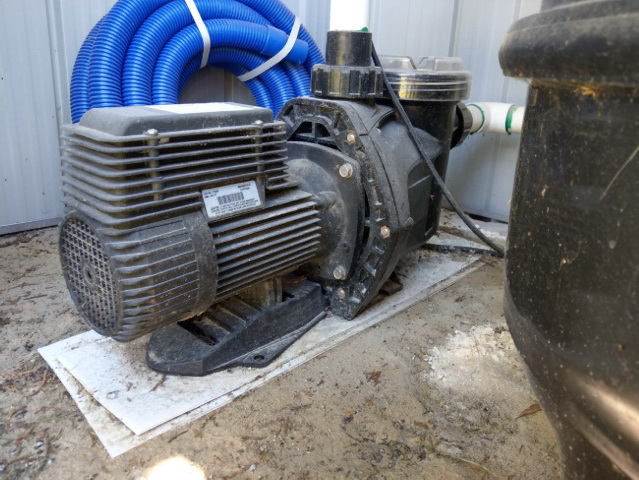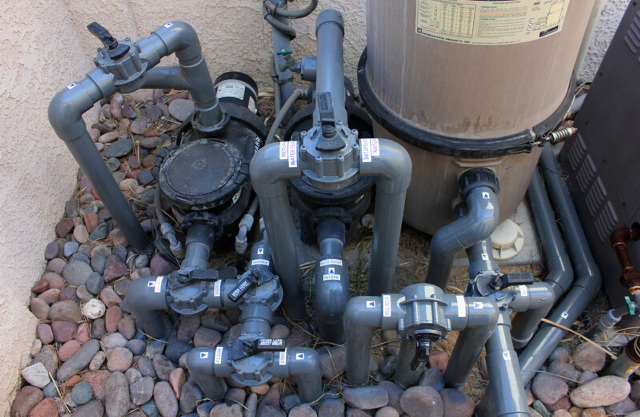One of the most common mistakes pool owners make is buying the wrong kind of pump when it’s time to replace it. You may perhaps be thinking about replacing your 1 HP pump with a 1.5 HP or even a 2 HP pump.
Is it OK to replace your smaller pool pump with a larger one?
It is OK to replace a 1 HP pool pump with a 1.5 HP pump if your pool pipes and filter can handle the additional flow. A larger pump will only be of benefit if the current pump is turning over the pool’s water volume at a rate of 1-2 times every 8 hours.

How To Find Out If Your 1-HP Pool Pump Can Be Replaced With A 1.5-HP
Before we discuss the pros and cons of upgrading, it only makes sense to consider what horsepower really means for a pool pump. But first, here is a quick overview of the three potential risk factors that can cause problems when using a more powerful pool pump.
1. Plumbing
The most obvious of them is the plumbing – your new pump may be the wrong size for your current piping system. Alternatively, the pool system may become less efficient with a larger pump.
2. Filter
The filtration system keeps your pool water safe. If it is overwhelmed, the water will no longer be getting properly disinfected. Plus, depending on the type of filter you use, a 1.5HP pump can ruin a filter and cause additional problems in the long term.
What Does HP Mean in a Pool Pump?
What most pool owners don’t realize is that the horsepower rating of their pump isn’t its true power rating. In fact, the first step to determining if your plumbing and filter are compatible with a larger pump is to calculate the Total Horsepower (or THP). Luckily, the formula is quite simple:
THP = HP (rated horsepower) x SF (service factor)
You’re probably wondering what exactly the service factor rating is. Without boring you with useless details, SF is an indication of how much additional strain the pump can handle, relative to the HP rating.
All you really need to remember is that the SF of your pump can usually be found on the label, right next to HP. Depending on the particular manufacturer, you may need to look up the SF on their website.
Plumbing – Will It Work With a 1.5HP Pump Replacement?
The vast majority of residential pools utilize either 1.5-inch or 2-inch pipes. Sure, you can buy expanders or reducers to make the pump match the plumbing size, but just because you can connect the pump, doesn’t mean that getting a bigger pump is the right thing for your pool.
Regardless of how many port reducers/expanders you use, every pipe size comes with a maximum capacity that is measured according to the smallest size.
The amount of water a pipe can handle is measured in gallons per minute. Here are the numbers:
- 3-inch ports – 220 GPM
- 2.5-inch ports – 140 GPM
- 2-inch ports – 100 GPM
- 1.5-inch ports – 60 GPM
If your pump’s your pool system needs to pump its entire volume through the filter approximately once every 8 hours. If that means you require a pumping rate of 60 GPM or higher, no horsepower upgrade will be sufficient enough.

Filter – Will It Work With a 1.5HP Pump?
Taking a dip in the pool should never come with health risks. And by overwhelming your filter with a 1.5HP pump, you risk swimming in contaminated water. You see, every filter comes with a GPM rating, which dictates the maximum amount of water it can properly filter in a given time period.
So if your new 1.5-horsepower pump is rated at 75 GPM but your filter only has a capacity for 70 GPM, your pool system becomes a health hazard. In fact, we highly recommend leaving a gap of at least 10 GPM, so the filter capacity is never maxed out. And unless you’d rather install a bigger filter, you’ll need to downsize back to a 1HP pump.
If you’re using a sand filter, the risk is even higher. Sand filter systems come with a structural flaw known as channeling. Channeling causes water to completely bypass the filtration process in high-GPM systems. If you don’t have a properly sized filter for a 1.5HP pump, the water pressure will form a “channel”, pushing the filter material to the sides.
Motor – Will a 1.5HP Pump Work?
First and foremost, you must make sure your circuit box can handle the voltage. Although most 1.5HP pumps are designed for regular 120v current, many newer models come in 230v. To avoid an additional trip to the hardware store, double-check both the pump label and your electric equipment pad.
Voltage aside, the only thing you need to worry about is the added power usage. Assuming an SF of 1.0, a 1.5HP pump uses about 1.75 kW/hr. Meanwhile, a 1HP unit only utilizes 1.1 Kw/hr. Assuming you run the motor at least 10 hours per day, that totals about 195 kWh every month. That’s an extra $30-50 every month, depending on your local electricity costs.
Does it Matter if Your Pump is Uprated VS Full-Rated?
The entire uprated vs full-rated debate is one big misdirect. Plainly speaking, manufacturers try to take advantage of inexperienced buyers by suggesting their pumps pack more power than they really do.
A few decades back, the only pool pumps on the market were full-rated. Their service factor ratings were based on efficiency at any given HP rating. But eventually, some manufacturers figured out that they can make cheaper, less powerful models because they advertise them only according to horsepower (not total horsepower).
For all intents and purposes, uprated really just means “less powerful”. For example, a typical 1HP full-rated pump will have an SF of 1.65, while an uprated 1HP unit only has a 1.25 SF. Plug these values into our THP formula and you’ll see a clear difference. The packaging of both units will say “1.0 HP”, but the full-rated pump actually packs 0.4THP more power.
Related Reading: 6 Reasons Why Your Pool Pump is Surging or Pulsing (And Fixes)
What About High-Flow or Controlled Pumps?
Not all pool pumps are created with the same purpose in mind. So some come with additional features that can mitigate the above issues. If you want to upgrade your pump, but are not ready to replace the plumbing, filter, and/or motor, one of these types may be your best bet.
Energy Efficient Pumps
Like any other appliance, pool pumps now come in Energy-Saver varieties. On average, these can save 25% in energy costs, which can make up for the added electricity costs of a bigger pump.
For instance, the Hayward PowerFlo LX is a fan-cooled unit that promises up to 33% in energy savings.
Variable Speed Pumps
As the name suggests, these pool pumps come with a number of speed settings. This allows you to adjust the flow to your ideal GPM rating.
Even a 2-speed pump, like Blue Wave’s Tidal Wave pump, can prevent going over your pool’s capacity. Of course, products such as the Black+Decker variable pump are ideal. If you can afford it, the Black+Decker has multiple speed options, a self-diagnostic unit, and comes with a 5-year warranty, so you really can’t go wrong.
Related Reading:
12 Reasons Pool Pumps Leak (and How to Fix)
20 Reasons Why Pool Pumps Lose Pressure (and what to do)




